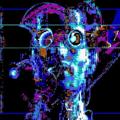nogoodnik ha recensito A Memory Called Empire di Arkady Martine
enjoyable + carried by exceptional worldbuilding
3 stelle
a fun read with beautiful, full worldbuilding and compelling politicking, and plenty of space opera to keep you from putting it down. for me, I didn't find it very striking as a plot or character book, though there's plenty of both, and didn't get much out of it as an ideas book (compared to other SF I've read that plays with self, empire, and language) that said, I do love books that know how to interact with language! linguist-me was left satisfied!
a fun read with beautiful, full worldbuilding and compelling politicking, and plenty of space opera to keep you from putting it down. for me, I didn't find it very striking as a plot or character book, though there's plenty of both, and didn't get much out of it as an ideas book (compared to other SF I've read that plays with self, empire, and language) that said, I do love books that know how to interact with language! linguist-me was left satisfied!






